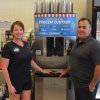Rita’s owners question county’s delayed code enforcement
Tom Minio and Erica Hite are the owners of three Rita’s Italian Ice and Frozen Custards locations in Sussex County. After going through an extensive permitting process for all three, the small business owners are questioning why Sussex County is retroactively enforcing code related to the installation of grease traps.
“We don’t know what triggered it,” said Hite. “It began with a random phone call from the county.”
Mino and Hite purchased the Rita’s in Midway in June 2020. They opened a location in Selbyville a couple years after that. More recently, they opened one in Long Neck.
All kinds of people have to sign off before building permits are issued or people aren’t allowed to open for business, said Minio. There’s a small amount of fat in custard, but it's contained and none of it gets dumped down the drain, he said.
“This is a hammer looking for a nail,” he said.
The original store, the one at Midway, is 20 years old and has never had a grease trap, said Minio. Nothing has changed, he said.
Minio estimated it would cost $1,500 to $2,000 to install a grease trap at each location. However, he said, it’s not about the cost.
“It could cost $2,” said Minio. “I don’t like the reach back. That’s what’s bugging me the most.”
Fats, oils and grease are a serious issue for wastewater systems, not just in Sussex County, but throughout the country, said Chip Guy, Sussex County spokesperson. An established, proactive policy to capture as much of these materials from entering the system, usually with grease traps, is critical toward ensuring the integrity and efficiency of a wastewater system for all users, he said.
In this case, said Guy, the county performed a routine compliance inspection of the Rita’s locations. During one of these inspections, he said, it was determined that no code-required grease-removal device was installed on site.
Routine compliance checks occur throughout the year, said Guy. This is not a case of retroactive enforcement, but one of ensuring compliance at all times to safeguard the system, he said, adding that compliance is mandatory at all sites because county code does not allow for grandfathering.
It is not clear why this issue was not identified during the original county permitting process, as the installation of such a device is part of established standards, said Guy. Whether it was an oversight by county staff or a misunderstanding on the part of the owner, the facilities must be compliant, he said.
The county sent Minio and Hite a letter in July saying they need to have the grease traps installed by March 21.
Ordinarily, if a violation is determined, the compliance deadline is a short amount of time, usually 30 days, said Guy. However, in this instance, the county is working with the owners given the extenuating circumstances and because the Rita’s locations close for the winter months.
Guy said if the facilities fail to meet the deadline, an official notice of violation will be issued, and the property owner could be subject to revocation of wastewater services.
Chris Flood has been working for the Cape Gazette since early 2014. He currently covers Rehoboth Beach and Henlopen Acres, but has also covered Dewey Beach and the state government. He covers environmental stories, business stories and random stories on subjects he finds interesting, and he also writes a column called Choppin’ Wood that runs every other week. He’s a graduate of the University of Maine and the Landing School of Boat Building & Design.


















































